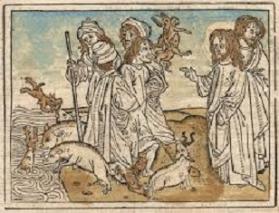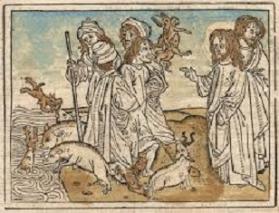SEPTEMBER 6, 2020 BY VANCEMORGAN
Iris Murdoch is one of my favorite philosophers and novelists, but I seldom get to use her work in my teaching. Murdoch claimed to be an atheist, but she also believed that true moral commitment requires belief in something greater than ourselves, something transcendent not subject to the vagaries and whims of human existence. In the midst of exploring these matters in her philosophical essays and her novels, she crafted several memorable definitions of basic moral concepts. I wrote about her definition of love in the context of a text from scripture last Thursday; this essay engages similarly with her definition of “freedom.”
Our contemporary understanding of “freedom” often amounts to “doing whatever I want to do.” Murdoch’s view of freedom was far more complex. “To be free,” she wrote, “is something like this: To live sanely without fear, and to perceive what is real.” Sanity. Fearlessness. Reality. These are the elements of being truly free. Murdoch once said in an interview that one of the best questions one can ask oneself is: “What are you afraid of?” If facing and overcoming fear is part of being free, then identifying one’s fears is crucial.

A strange gospel story from Luke’s gospel addresses all three of Iris Murdoch’s concepts: sanity, facing one’s fears, and the burden of orienting oneself afterward to live in a new, clearer reality. We find Jesus in the land of the Gerasenes, in what would be modern-day Jordan. There he encounters a man “who had demons,” a man who has been living naked “among the tombs” for many years. The man (or the demons) knows Jesus on sight and begs for mercy. After a brief exchange, Jesus casts the demons out of the man and, agreeing to their request, sends them into a herd of swine minding their own business close by.
The pigs rush down a hill into a nearby lake and drown. The swineherds run to town reporting what just happened (and undoubtedly also to file a legal claim against Jesus for ruining their livelihood). Although somewhat unusual, on one level the story is just another tale of Jesus’ compassion and healing powers. Hidden in the narrative, however, are at least a couple of details worth considering.
The man knows Jesus’ name, but Jesus does not know his, nor apparently does he know the identity of the entities possessing the man. Jesus asks “What is your name?” to which the man answers “‘Legion,’ for many demons had entered him.” I heard my recently departed friend Marsue give a sermon on this text a number of years ago; she asked her congregation to consider Jesus’ question: What is your name? She advised the congregation to “name your demons.” For me, the first steps toward naming my demons begin with identifying those persons and situations I am most uncomfortable with and asking: “What am I so afraid of? What is its name?”
A popular and pervasive strategy concerning one’s fears in our contemporary world is to project them onto the “other,” whether defined by religious commitment, racial identity, countries of origin, or sexual orientation. It is much easier to externalize and project our fears than it is to realize that our fears and concerns always are rooted much more closely to home than we choose to accept. If my consistent answer to “what are you afraid of?” is “those who are most unlike me,” it is time to consider the possibility that I am projecting on others what I fear about myself.
After Jesus casts the demons into the pigs, the news spreads quickly and the community comes to see the healed man “clothed and in his right mind.” But instead of rejoicing in their neighbor’s healing, “all the people of the surrounding country of the Gerasenes asked Jesus to leave them; for they were seized with great fear.” What were these people afraid of? Their disturbing reaction to the healing of a tormented and troubled neighbor raises another important question. Not only does each of us need to ask “what am I afraid of?” but each of us also needs to ask “do I want to be free of that fear?” For years, the residents of Gerasa were very clear about who this demon-possessed man was and how to handle him. “Stay away from him.” “He’s dangerous.” “There’s no hope for him—best to ignore him as much as possible.” But now, all of a sudden, everything has changed.
Dealing with demons is a risky business. Risky, because I might be so comfortable with my demons that I cannot imagine life without them. As Jesus asked the man at the pool of Bethsaida in John’s gospel: “Do you want to be made whole?” The answer might seem obvious, but this is a complicated question. Although we might deny it, the immediate answer for many of us is undoubtedly “I’m not so sure.” I can’t imagine myself without my prejudices, my preconceptions, my weaknesses—many of which I did not choose but which have defined me for longer than I can remember.
This is also risky for those around me, because now all of their preconceptions are brought to light as well. All of the categories that defined the previously demon-possessed man—someone to be avoided, a dangerous person, insane—now have to be rethought. More generally, they have discovered that the “other” is exactly the same as they are.
Challenging our preconceptions and discovering what is common among us rather than what divides us is very difficult work, work that directly challenges our comfortable categorizations. Do we really want to know that those whom we regularly keep at arm’s length are, regardless of religious commitment, race, or sexual orientation, exactly the same as we are in every respect that matters? The citizens of Gerasa knew that what had just happened to the demon-possessed man was a total game changer—and they were not ready or willing to play the new game.
We are not told how the Gerasenes responded to the healed man over time, but we do know that they asked the man responsible for the healing to leave. As Iris Murdoch suggests, being free requires not only facing our fears, but also sanely inhabiting a new, clearer reality. Naming our demons requires taking responsibility for what comes afterward—a radical reshaping of everything we think, say, and do. It might be a lot easier just to hang on to our demons. Unless, of course, we actually want to be free.
